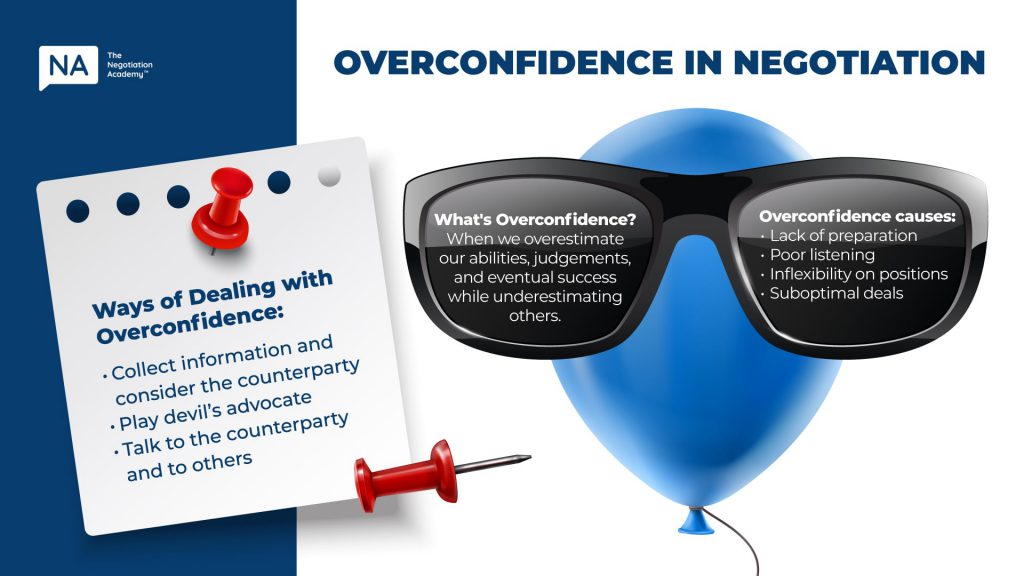
Welcome back to our series on cognitive biases in negotiations!
This week, we will cover another cognitive bias that shrinks our ZOPA and hinders our negotiation success: Overconfidence.
The Overconfidence Effect
The sinking of the Titanic. The nuclear accident at Chernobyl. You running late because you underestimated traffic (again😁😘). Just a few ‘victims’ of the overconfidence effect.
Overconfidence bias happens when we overestimate our abilities, judgments, and estimated successwhile underestimating all these aspects for our environment or counterparty.
“I am definitely not overconfident, Claudia“. “I am a perfectionist in constant panic over the quality of my work.” “If anything, I suffer from imposture, not overconfidence” – I hear some of you say.
But bear with me, because none of this “saves” you from the overconfidence effect we are talking about!
Oftentimes, the overconfidence effect is not so much about our technical abilities, which is why even those of us with full-on imposture syndrome (basically almost everyone😅) can be affected.
Even those with constant (overachiever) doubts in their technical skills may still be overconfident in their assumptions (“I am sure they just want money”), judgements (“he really doesn’t want to settle this”), or gut assessments (“this case is not worth more than 100k if taken to court”).
All of these drive our negotiation strategy and are proven to be assessed wrongly (with lots of confidence) routinely.
This has severe consequences for negotiations, including
- Lack of preparation
- Poor listening
- Inflexibility
- Suboptimal deals

Dealing with the Overconfidence Effect
One way of dealing with the overconfidence effect is to find the middle ground between the confidence that comes from proper preparation and the willingness to consider the possibility that we are wrong in our assumptions. Here are some steps to help you with that.
1. (Over)preparation
It pays to be (over)prepared. Most people don’t realize that preparation is 80% of negotiation success and skimp on this bit. And it shows!
Collect as much information as you can about your situation as well as your counterparty:
- Our and their Interests
- Our and their Goals and Priorities
- Options for your side and theirs
- Information you can share with them
- Questions you need to ask them
- Your best alternative to no agreement (BATNA) and theirs
- Your Target Price
- Your Limit/Reserve Price
- Your Opening Price
- Estimates of their numbers (remember to update this when new information arrives)
[Download our free 7-step preparation sheet here to help you cover all of these!]
Remember: Negotiation is a preparation game.“Wins” are not decided in the ring but in training.
2. Play Devil’s Advocate
This helps you consider gaps in your preparation with some honest self-examination. To counter the problem of ‘over-precision,’ try asking yourself a few questions:
- Who did you rely on for your sources of information? What might you be missing?
- What information is your counterparty likely to know better?
- What assumptions did you make?
- What are the weaknesses of your case/situation?
- What are their likely strengths and weaknesses?
3. Ask more Questions and Be willing to listen
Even if our preparation was perfect, you will never have perfect information. Asking more open questions and listening to your client and counterparty intently could open up opportunities for new insights, ways of collaboration or other ways of discovering information that enhances the negotiation for both sides.
Collaborating in the process or sharing your preparation with colleagues and peers could also give you fresh perspectives on what you might have missed.
Finding this “Goldilocks” zone between having enough confidence while being open to revising what we know takes time to develop, but it is well worth it for you and your clients.
Bonus Read & Example
For the story of Andrew Carnegie “losing” 100 Mio $ to the Overconfidence Effect (and lack of preparation) see this PON Blog.
To your negotiation success!
We share a lot of what we’ve learned by training businesses and law firms with their negotiation in our online courses and live sessions.
Joining one of our courses will put you on par with over 10,000 leading lawyers from Fortune 500 companies to Tier 1 law firms globally, boosting your negotiation skills to new heights.
If you want to see how these biases happen in real life, try one of our online courses or join a tailor-made live training session for your organization!


